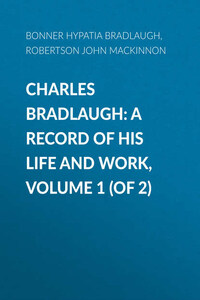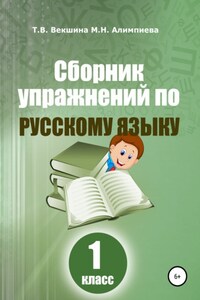PREFACE
"I wish you would tell me things, and let me write the story of your life," I said in chatting to my father one evening about six weeks before his death. "Perhaps I will, some day," he answered. "I believe I could do it better than any one else," I went on, with jesting vanity. "I believe you could," he rejoined, smiling. But to write the story of Mr Bradlaugh's life with Mr Bradlaugh at hand to give information is one thing: to write it after his death is quite another. The task has been exceptionally difficult, inasmuch as my father made a point of destroying his correspondence; consequently I have very few letters to help me.
This book comes to the public as a record of the life and work of a much misrepresented and much maligned man, a record which I have spared no effort to make absolutely accurate. Beyond this it makes no claim.
For the story of the public life of Mr Bradlaugh from 1880 to 1891, and for an exposition of his teachings and opinions, I am fortunate in having the assistance of Mr J. M. Robertson. We both feel that the book throughout goes more into detail and is more controversial than is usual or generally desirable with biographies. It has, however, been necessary to enter into details, because the most trivial acts of Mr Bradlaugh's life have been misrepresented, and for these misrepresentations, not for his acts, he has been condemned. Controversy we have desired to avoid, but it has not been altogether possible. In dealing with strictures on Mr Bradlaugh's conduct or opinions, it is not sufficient to say that they are without justification; one must show how and where the error lies, and where possible, the source of error. Hence the defence to an attack, to our regret, often unavoidably assumes a controversial aspect.
A drawback resulting from the division of labour in the composition of the book is that there are a certain number of repetitions. We trust, however, that readers will agree with us in thinking that the gain of showing certain details in different relations outweighs the fault of a few re-iterations.
In quoting Mr Bradlaugh's words from the National Reformer, I have for the sake of greater clearness and directness altered the editorial plural to the first person singular.
I desire to express here my great indebtedness to Mrs Mary Reed for her help, more especially in searching old newspaper files with me at the British Museum.
Hypatia Bradlaugh Bonner.
1894.
CHAPTER I
PARENTAGE AND CHILDHOOD
Although there has often been desultory talk among us concerning the origin of the Bradlaugh family, there has never been any effort made to trace it out. The name is an uncommon one: as far as I am aware, ours is the only family that bears it, and when the name comes before the public ours is the pride or the shame – for, unfortunately, there are black sheep in every flock. I have heard a gentleman (an Irishman) assure Mr Bradlaugh that he was of Irish origin, for was not the Irish "lough" close akin to the termination "laugh"? Others have said he was of Scotch extraction, and others again that he must go to the red-haired Dane to look for his forbears. My father would only laugh lazily – he took no vivid interest in his particular ancestors of a few centuries ago – and reply that he could not go farther back than his grandfather, who came from Suffolk; in his boyhood he had heard that there were some highly respectable relations at Wickham Market, in Suffolk. But so little did the matter trouble him that he never verified it, though, if it were true, it would rather point to the Danish origin, for parts of Suffolk were undoubtedly colonized by the Danes in the ninth century, and a little fact which came to our knowledge a few years ago shows that the name Bradlaugh is no new one in that province.
Kelsall and Laxfield,1 where there were Bradlaughs in the beginning of the 17th century; Wickham Market and Brandeston, whence Mr Bradlaugh's grandfather came at the beginning of the 19th, and where there are Bradlaughs at the present day, are all within a narrow radius of a few miles. The name Bradlaugh commenced to be corrupted into Bradley prior to 1628, as may be seen from a stone in Laxfield Church, and has also been so corrupted by a branch of the family within our own knowledge. The name has also, I know, been spelled "Bradlough."
James Bradlaugh, who came from Brandeston about the year 1807, was a gunsmith, and settled for a time in Bride Lane, Fleet Street, where his son Charles, his fourth and last child, was born in February 1811. He himself died in October of the same year, at the early age of thirty-one.
Charles Bradlaugh (the elder) was in due course apprenticed to a law stationer, and consequently this became his nominal profession; in reality, he was confidential clerk to a firm of solicitors, Messrs Lepard & Co. The apprentice was, on the occasion of some great trial, lent to Messrs Lepard, and the mutual satisfaction seems to have been so great that it was arranged that he should remain with them, compensation being paid for the cancelling of his indentures. I have beside me at the moment a letter, yellow and faded, dated July 30th, 1831, inquiring of " – Batchelour, Esq.," concerning the character of "a young man of the name of Bradlaugh," with the answer copied on the back, in which the writer begs "leave to state that I have a high opinion of him both as regards his moral character and industrious habits, and that he is worthy of any confidence you may think proper to place in him."








